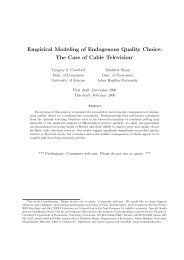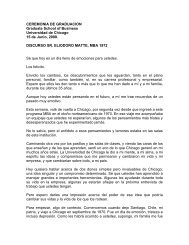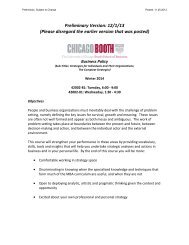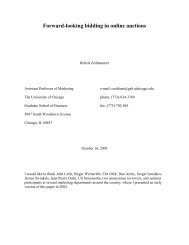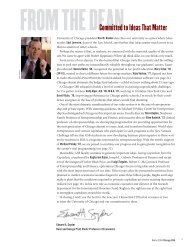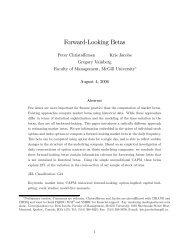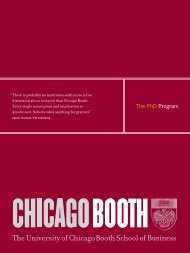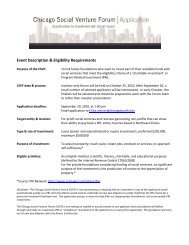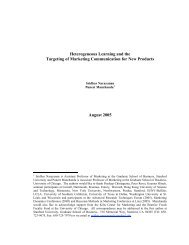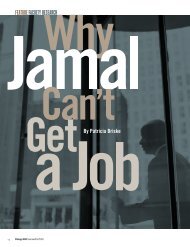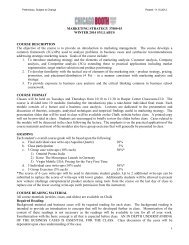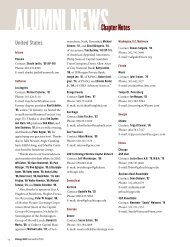Ph.D. Program Guidebook - The University of Chicago Booth School ...
Ph.D. Program Guidebook - The University of Chicago Booth School ...
Ph.D. Program Guidebook - The University of Chicago Booth School ...
Create successful ePaper yourself
Turn your PDF publications into a flip-book with our unique Google optimized e-Paper software.
<strong>Ph</strong>.D. <strong>Program</strong> <strong>Guidebook</strong> 2007-2008<br />
for plagiarism may include expulsion from the university. Refer to the section covering<br />
“Academic Honesty” in the university’s Student Manual <strong>of</strong> <strong>University</strong> Policies and<br />
Regulations for more details. Group work must be clearly indicated as group work.<br />
EXAMINATIONS AND OTHER GRADED WORK<br />
Students must not represent another’s work as their own. Communication is not permitted<br />
between students during an examination or on an assignment. For examinations, the use <strong>of</strong><br />
notes and books is not permitted, except when specifically permitted by the faculty member.<br />
Use <strong>of</strong> calculators and other electronic equipment in the classroom and during examinations<br />
is entirely at the discretion <strong>of</strong> the faculty member. Students should inquire specifically as to<br />
the appropriateness <strong>of</strong> a programmable calculator and other electronic equipment during an<br />
exam. In the case <strong>of</strong> take-home examinations and all other graded work, unless otherwise<br />
stipulated by the instructor, students may use any written, printed, or otherwise recorded<br />
material to find the solution. A paper may be submitted for one course only. Any exception<br />
requires advance approval in writing from all pr<strong>of</strong>essors concerned. <strong>The</strong> title page on a paper<br />
should indicate the course (or courses) for which it is submitted. Failure to follow these rules<br />
will result in disciplinary action.<br />
Examination Policies<br />
Students are expected to be available to write examinations during scheduled exam periods.<br />
<strong>The</strong> examination schedule for final exams is listed in the Curriculum Guide, and online via<br />
the <strong>Chicago</strong> GSB Portal at portal.<strong>Chicago</strong>GSB.edu. Students should check the examination<br />
calendar carefully when scheduling courses to avoid exam time conflicts or enrolling in a<br />
schedule in which more than two exams are scheduled on the same day.<br />
Students should not approach instructors with requests to reschedule exams or to make<br />
special accommodations. Students with special circumstances, such as illness or grave<br />
personal difficulties such as a death in the family, should contact <strong>Ph</strong>.D. <strong>Program</strong> Office,<br />
which will work with the faculty in appropriate cases to find a resolution.<br />
A time conflict due to a job interview, start date <strong>of</strong> an internship or full-time position, or<br />
personal travel is not an appropriate reason to request accommodation on an academic<br />
commitment.<br />
THESE POLICIES EXTEND TO ALL GRADED WORK (MIDTERMS, TAKE-HOME EXAMS,<br />
GROUP PROJECTS, CASES, ETC.) FOR WHICH A DEADLINE IS IMPOSED BY THE INSTRUCTOR<br />
SEXUAL HARASSMENT<br />
<strong>The</strong> university is committed to maintaining an academic environment in which its members<br />
can freely work together, both in and out <strong>of</strong> the classroom, to further education and research.<br />
<strong>The</strong> university cannot thrive unless each member is accepted as an autonomous individual<br />
and is treated civilly, without regard to his or her sex, or, for that matter, any other factor<br />
irrelevant to participation in the life <strong>of</strong> the university. Members <strong>of</strong> the university should<br />
understand that this standard must shape our interactions regardless <strong>of</strong> whether it is backed<br />
up by the threat <strong>of</strong> sanctions. Certain types <strong>of</strong> behavior may be inappropriate even though not<br />
“illegal”; speech can be <strong>of</strong>fensive, even though allowed. Sexual harassment by any member<br />
<strong>of</strong> the university community is prohibited. Without feeling constrained by specific<br />
definitions, any person who believes that his or her educational or work experience is<br />
compromised by sexual harassment should feel free to contact an advisor or director in his or<br />
her appropriate program <strong>of</strong>fice to discuss the situation. A student may also seek assistance<br />
from a sexual harassment complaint advisor. A current list <strong>of</strong> advisors is available online at<br />
rev. 7/2007 87



